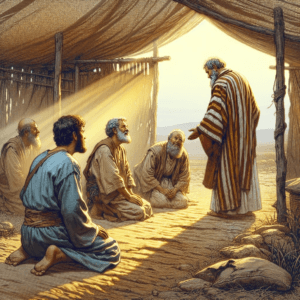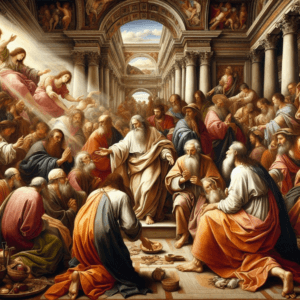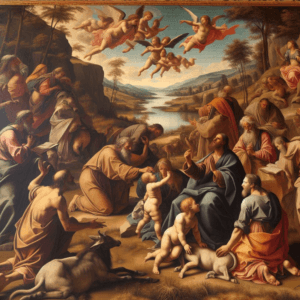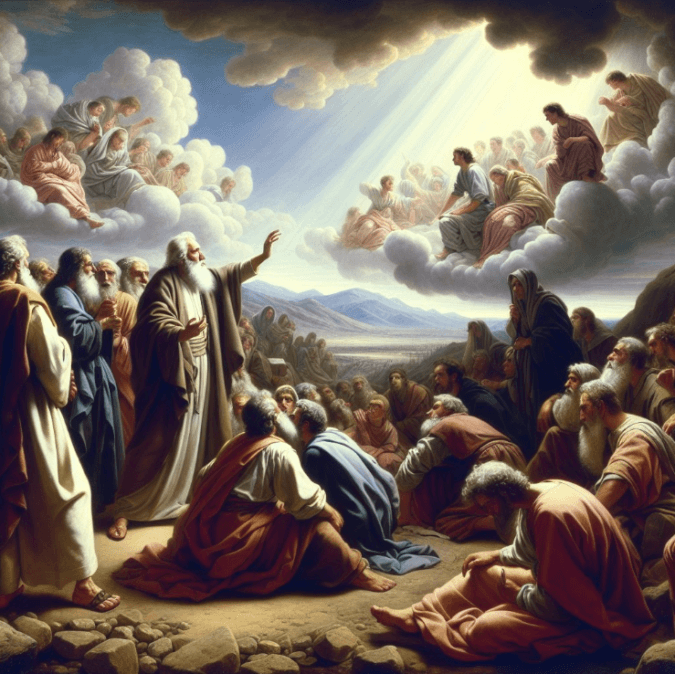GOD REAFFIRMS HIS PROMISE part 1
Until you get to the New Testament, you may wonder why the eighteenth and nineteenth chapters of Genesis are included in the Bible. They seem rather detached from the story of Abraham.
They deal with the destruction of Sodom and Gomorrah. Chapter 18 is a rather lengthy chapter in which God tells Abraham about the judgment of Sodom and Gomorrah and Abraham intercedes on behalf of the cities of the plain.
This is an illustration, I think, of the blessed Christian life, of life in fellowship with God. But in chapter 19, down in Sodom and Gomorrah with Lot, we will see what I would call the blasted life—all because of a decision that was made.
Unfortunately, we have both kinds among Christians today—those living a blessed life and those living a blasted life. There are those who have really made shipwreck of their lives; they have gotten entirely out of the will of God.
I would not suggest even for a moment that they have lost their salvation, but they sure have lost everything else. As Paul says, they are saved, “. . . yet so as by fire” (l Cor. 3:15).
The events of Genesis 18 take place not long after God’s visit with Abraham in chapter 17. This visit from the Lord is quite different, however.
It’s not clear, at first, if Abraham even recognizes the three men who appear outside of his tent as the Lord and two angels in human form. In either case, Abraham runs to show them deep respect and hospitality.
He tells Sarah to bake them bread and has a young calf slaughtered for them to eat as they rest in the heat of the day.
Genesis 18:1-8 KJV
[1] And the LORD appeared unto him in the plains of Mamre: and he sat in the tent door in the heat of the day;
[2] And he lift up his eyes and looked, and, lo, three men stood by him: and when he saw them, he ran to meet them from the tent door, and bowed himself toward the ground,
[3] And said, My Lord, if now I have found favour in thy sight, pass not away, I pray thee, from thy servant:
[4] Let a little water, I pray you, be fetched, and wash your feet, and rest yourselves under the tree:
[5] And I will fetch a morsel of bread, and comfort ye your hearts; after that ye shall pass on: for therefore are ye come to your servant. And they said, So do, as thou hast said.
[6] And Abraham hastened into the tent unto Sarah, and said, Make ready quickly three measures of fine meal, knead it, and make cakes upon the hearth.
[7] And Abraham ran unto the herd, and fetcht a calf tender and good, and gave it unto a young man; and he hasted to dress it.
[8] And he took butter, and milk, and the calf which he had dressed, and set it before them; and he stood by them under the tree, and they did eat.
Genesis 18:1
And the LORD appeared unto him in the plains of Mamre: and he sat in the tent door in the heat of the day;
 Abraham is living down there in Mamre, and he’s an old man, by the way. An unexpected encounter between Abraham and the Lord begins with this verse. It is very different from God’s appearance to Abraham in the previous chapter.
Abraham is living down there in Mamre, and he’s an old man, by the way. An unexpected encounter between Abraham and the Lord begins with this verse. It is very different from God’s appearance to Abraham in the previous chapter.
This time, Abraham may not even be aware, at first, that one of the three men standing near his tent is the Lord in human form.
When the Lord takes human form to interact with people on earth, Bible scholars call it a theophany. Given the second revelation about the birth of Isaac the Lord will give, this appearance cannot have come long after the one in Genesis 17.
Abram is living near Hebron, by the oaks of Mamre, the area first mentioned in Genesis 13. The heat of the day, the middle of the afternoon, would have been a time of rest for most people living in this desert region.
Abraham was sitting at the door of his tent, likely waiting for the sun to grow less intense before continuing his day.
Genesis 18:2
And he lift up his eyes and looked, and, lo, three men stood by him: and when he saw them, he ran to meet them from the tent door, and bowed himself toward the ground,
 Notice the hospitality that Abraham extends. The little story that I told in the previous chapter has a basis of fact, at least, although I don’t think it ever took place. The point is that this man Abraham is a very gracious, hospitable man.
Notice the hospitality that Abraham extends. The little story that I told in the previous chapter has a basis of fact, at least, although I don’t think it ever took place. The point is that this man Abraham is a very gracious, hospitable man.
Abraham, sitting at the entrance to his tent in the heat of the day, looks up and suddenly notices three men standing nearby. He seems startled to see them. Given who these three men are, it’s possible they appeared out of thin air.
Or, more simply, they were simply not noticed until they’d gotten fairly close. In any case, Abraham had not noticed them before.
This passage indicates that these men are God, in a temporary human form, as well as two angels (Genesis 18:1). This kind of physical appearance of God is referred to as a theophany.
It’s not clear whether Abraham immediately understood one of these men to be the Lord or simply saw them as strangers. He hurried toward them and bowed low, a sign of great respect, especially coming from a wealthy and important man.
Whomever he thought these men to be, Abraham saw it as his responsibility to greet them warmly and offer them hospitality.
Genesis 18:3
And said, My Lord, if now I have found favour in thy sight, pass not away, I pray thee, from thy servant:
 Abraham is really entertaining these men royally. Abraham, seeing three unexpected strangers standing near his tent in the heat of the day, rushes toward them, bows low before them, and earnestly asks them not to pass by.
Abraham is really entertaining these men royally. Abraham, seeing three unexpected strangers standing near his tent in the heat of the day, rushes toward them, bows low before them, and earnestly asks them not to pass by.
He practically begs the leader of the group to stop and spend time with him.
According to earlier verses, these three men are actually God, in a physical form, and a pair of angels. It remains unclear, still, if Abraham understands that the leader of these three is indeed the Lord.
His language would certainly be appropriate for addressing God. He calls Him Lord, asking Him to stop if Abraham has found favor in His eyes.
However, Abraham’s respectful language may also represent the appropriate and gracious standard for welcoming strangers in his part of the ancient world.
That culture placed an enormous value on social graces, including respect. This style of modest speech would have been the norm when dealing with strangers.
Genesis 18:4
Let a little water, I pray you, be fetched, and wash your feet, and rest yourselves under the tree:
 It seems very strange to us to tell a visiting stranger to wash his feet and come in. We wouldn’t quite say that today, but this is probably the oldest custom that is known.
It seems very strange to us to tell a visiting stranger to wash his feet and come in. We wouldn’t quite say that today, but this is probably the oldest custom that is known.
Remember that in the Upper Room our Lord washed the disciples’ feet—and there is a tremendous spiritual message there.
Here Abraham says, “Wash your feet.” It was a token of real hospitality when someone came into a home to have him take off his shoes and wash his feet.
In that day they did not take off their hat, but they did take off their shoes. Today we have reversed it. When you come to visit somebody, you leaves your shoes on and take off your hat.
Abraham, sitting in the door to his tent in the heat of the day, is startled to see three men standing not far from him. One of the men was the Lord in human form, an event referred to as a theophany.
The other two are angels. In prior verses, Abraham ran out to greet them, bowed low with great respect, and asked the Lord not to pass by.
Here, Abraham urges them to rest under the shade of the tree, to have some water and have their feet washed. Foot washing was not only a sign of politeness and respect, but also of hospitality.
Depending on who did the actual washing—usually a servant—it could also carry a sense of submission.
Abraham’s eager hospitality may have been representative of the common attitude towards strangers in his culture, but he was also showing appropriate hospitality to the Lord who had given him the covenant promises and commands of the previous chapter.
Genesis 18:5
And I will fetch a morsel of bread, and comfort ye your hearts; after that ye shall pass on: for therefore are ye come to your servant. And they said, So do, as thou hast said.
 Isn’t this a marvelous way of entertaining?
Isn’t this a marvelous way of entertaining?
Abraham continues to plead with the three men who appeared near his tent not to leave too quickly. One of the men is the Lord in human form. The other two are angels also disguised as humans.
After asking them to receive rest and water and the washing of their feet in the previous verse, Abraham now includes the offer of a morsel of bread before they pass on.
As the following verses will reveal, Abraham is vastly understating the meal he plans to provide.
Abraham, a wealthy and powerful man with many servants, refers to himself as the servant of these men. Indeed, he acts as if he were a servant eager to please his master.
This might have been Abraham’s way of expressing his culture’s typical approach to hospitality. Or, his extravagant response might have been because he knew, immediately, with whom he was speaking.
Finally, the strangers agree to wait while Abraham provides for their refreshment.
Genesis 18:6
And Abraham hastened into the tent unto Sarah, and said, Make ready quickly three measures of fine meal, knead it, and make cakes upon the hearth.
 Abraham has prepared a sumptuous meal. When God assumes a temporary human form, it is referred to as a theophany.
Abraham has prepared a sumptuous meal. When God assumes a temporary human form, it is referred to as a theophany.
This incident is an example: God, appearing as a man, has arrived with two angels—who also appear to be human—near Abraham’s tent.
Abraham has responded by bowing before them and urging them to stay while he provides some water and a “morsel of bread” for their refreshment. Abraham’s behavior might be the usual ancient eastern approach to hospitality.
Or, possibly, he quickly realized that the men he was speaking to were not ordinary men.
Now he runs back to the tent and tells Sarah to quickly make cakes, meaning loaves of bread, for the three visitors. However, he tells her to use with three seahs of fine flour.
In modern measurements, this would be approximately 21 quarts or liters! That would make an extravagant amount of bread for just three men. But the cakes / loaves are just the beginning. Abraham is engineering a royal feast.
Genesis 18:7
And Abraham ran unto the herd, and fetcht a calf tender and good, and gave it unto a young man; and he hasted to dress it.
 He took a little calf, a servant killed and prepared it, and the chef probably barbecued it. They had veal steaks or veal roast, I imagine, and all the trimmings that went with it.
He took a little calf, a servant killed and prepared it, and the chef probably barbecued it. They had veal steaks or veal roast, I imagine, and all the trimmings that went with it.
The text here makes clear that Abraham is hurrying. Having convinced three unexpected visitors, including God in human form, to stay and allow Abraham to provide them water and a bit of bread, Abraham now rushes to provide them with a feast.
In the previous verse, Abraham told Sarah to quickly make cakes of bread for them. He specified that she should use more than five gallons, some 21 liters, of fine flour; this would have made a very large banquet of bread.
Now, the wealthy and powerful Abraham hurries to his herd of cattle and grabs a tender calf to give to a young male servant to quickly prepare for the meal.
Abraham is both eager to serve the Lord and eager for them not to leave. Abraham behaves as the Lord’s servant, exhibiting both the warm hospitality of a good host and an attitude of submission.
His passion is revealed in the terms used in this passage: Abraham “went quickly” (Genesis 18:6), he “ran,” and the young man prepared the meat “quickly.”
Genesis 18:8
And he took butter, and milk, and the calf which he had dressed, and set it before them; and he stood by them under the tree, and they did eat.
 “And he took butter, and milk”—my, it was a real feast! Finally the meal is ready for Abraham’s three visitors, one of whom is the Lord in human form. In the previous verses, Abraham rushed to prepare a royal feast.
“And he took butter, and milk”—my, it was a real feast! Finally the meal is ready for Abraham’s three visitors, one of whom is the Lord in human form. In the previous verses, Abraham rushed to prepare a royal feast.
This included an enormous amount of bread made from fine flour (Genesis 18:6) and a young calf quickly slaughtered and prepared (Genesis 18:7). Now Abraham presents the food, along with some curds and milk, likely a kind of yogurt.
Acts of generous hospitality, along with the contents of the meal, would have been standard among the Bedouin people of the time. It would also have been normal for the host to stand back and allow his guests to eat in peace without him.
For this reason, some scholars suggest Abraham may not have known, yet, that this stranger was actually the Lord. According to this view, Abraham was merely exhibiting the qualities of a generous and kind-hearted host.
At the same time, Abraham’s hospitality here is extravagant. In either case, Abraham will clearly come to understand who his guest is in the following verses.

GOD REAFFIRMS HIS PROMISE part 2
Once the meal is over, the Lord fully reveals Himself, in a conversation He conducts with Sarah through Abraham while she remains hidden and listening in the tent.
First, the Lord asks where Sarah is and then reveals to her what He had said to Abraham in the previous chapter: by this time a year from now she will have a son.
Sarah’s response is much the same as Abraham’s in the previous chapter: she laughs to herself. Not only was she around 90 years old, we’re told that the “way of women” had ceased for her.
The phrasing here might suggest the idea of menopause: Sarah is literally “beyond” a woman’s normal ability to conceive. She describes herself as worn out and her husband as old. She cannot imagine having the “pleasure” of a new birth in their season of life.
The Lord knows both that Sarah laughed and what she thought about His revelation. He asks Abraham why she laughed. “Is anything too hard for the LORD?” Then He repeats the promise of a son at the appointed time.
Sarah, likely realizing now that this is God, is afraid. She lies and says that she did not laugh. The Lord corrects her once more, but He does not punish her. In another instance of divine humor, He has already named her child Isaac, which means laughter.
The three men then set out on their journey, walking from Abraham’s home near Hebron toward the city of Sodom. Abraham walks with them for a time, until they arrive at a high vantage point from which they can look across and see Sodom.
From there, the Lord reveals to Abraham His plan regarding the grave sins of Sodom and Gomorrah. The implication is that God will bring judgment on those people if their sins were as wicked as He had heard.
This, of course, is a figure of speech, since God already knows exactly how sinful these cities are. The reason for this human perspective is revealed in the conversation with Abraham, as Abraham tries to specify just “how wicked” these cities must be to earn God’s wrath.
As the two angels walk on toward the city, Abraham begins a kind of negotiation with the Lord. His nephew Lot and his family live in Sodom. Abraham seems to be concerned for them.
He boldly challenges the Lord: Will you sweep away the righteous with the wicked?
Abraham insists that such an action would not be consistent with the Lord’s character. The Lord is patient with Abraham as he begins to ask for assurances.
Will you destroy the city if you find 50 righteous people there?
The Lord agrees that He will not. Abraham keeps asking though, lowering the number at which the Lord would willingly destroy righteous people to judge the wicked.
45? 40? 30? 20?
Finally, Abraham asks, with a request that the Lord not be angry, if He would spare the city for the sake of 10 righteous people. Once more, the Lord agrees that He would do so if He finds that many.
With that, the Lord heads toward the city, and Abraham walks back home.
Genesis 18:9-16 KJV
[9] And they said unto him, Where is Sarah thy wife? And he said, Behold, in the tent.
[10] And he said, I will certainly return unto thee according to the time of life; and, lo, Sarah thy wife shall have a son. And Sarah heard it in the tent door, which was behind him.
[11] Now Abraham and Sarah were old and well stricken in age; and it ceased to be with Sarah after the manner of women.
[12] Therefore Sarah laughed within herself, saying, After I am waxed old shall I have pleasure, my lord being old also?
[13] And the LORD said unto Abraham, Wherefore did Sarah laugh, saying, Shall I of a surety bear a child, which am old?
[14] Is any thing too hard for the LORD? At the time appointed I will return unto thee, according to the time of life, and Sarah shall have a son.
[15] Then Sarah denied, saying, I laughed not; for she was afraid. And he said, Nay; but thou didst laugh.
[16] And the men rose up from thence, and looked toward Sodom: and Abraham went with them to bring them on the way.
Genesis 18:9
And they said unto him, Where is Sarah thy wife? And he said, Behold, in the tent.
 In the culture of the day, it is not customary for a man to inquire about the wife of another man. Therefore Abraham is probably curious about the inquiry we see here.
In the culture of the day, it is not customary for a man to inquire about the wife of another man. Therefore Abraham is probably curious about the inquiry we see here.
Perhaps there is something about these men that causes Abraham to accept the question, so he replies that she is in the tent. In the prior verses, Abraham arranged a large meal for three unexpected visitors.
His actions exhibit generosity, humility, and grace. Whether or not Abraham knew these men were God and two angels in human form is unknown. However, that fact will become obvious as they continue their conversation.
Starting here, in verse 9, Abraham’s visitors have finished the meal, and begin to reveal the purpose of their visit. Their first question shows they know more about Abraham than they have let on.
They know of his wife Sarah, and they ask where she is. Abraham replies that Sarah is in the tent. We will soon learn that she is listening intently to this interaction.
As with other questions asked by God or His messengers, the purpose is not to gain information. God and His companions know exactly where Sarah is.
And yet, just as parents often “ask” children questions in order to clarify ideas, God has a habit of using questions, rather than statements, in order to force man to acknowledge his situation (Genesis 3:9; Acts 9:4).
Genesis 18:10
And he said, I will certainly return unto thee according to the time of life; and, lo, Sarah thy wife shall have a son. And Sarah heard it in the tent door, which was behind him.
 One of the guests speaks, and in so doing he states that he will return later. Opinions vary on the figure of speech according to the time of life used to describe when the return will occur.
One of the guests speaks, and in so doing he states that he will return later. Opinions vary on the figure of speech according to the time of life used to describe when the return will occur.
One view is that it will be at the beginning of another year from the present moment.
Another opinion is that it will be when the dormancy of winter is changing to the new life of spring. Romans 9: 9 offers the translation “at this time will I come,” but this doesn’t help much in pointing to one interpretation over the other.
Genesis 18: 1 implies that this conversation takes place in the heat of summer, so the interpretations of the timing of the promised return vary by only a few months in any case.
As the special guest continues, Sarah has positioned herself on the other side of the tent flap, directly behind the one who is speaking.
What she overhears is a shocking statement to one of her age, for the man announces that at the time of his return she will have a son. Abraham has been entertaining three strangers who arrived mysteriously outside of his tent.
He hurried to provide a royal feast for them. It’s unclear whether Abraham understood clearly that one of the men was the Lord in human form before this moment, but now the Lord will reveal Himself completely.
In the prior verse, the visitors asked where Sarah was. Knowing that these men are God and two angels, this question is really for Abraham’s benefit, not their own.
Here, God speaks to Abraham about Sarah with the full knowledge that she is listening. The Lord repeats what He has said to Abraham in the previous chapter. This time, though, He speaks in a way that Sarah will be sure to hear.
God announces, and Sarah clearly hears, that she will have a son by this time next year, when the Lord plans a return visit. Hearing such an announcement would clearly confirm for Abraham that this was the Lord who had made the same promise to him in the previous chapter.
Sarah, though, seems to be hearing this promise for the first time. Most likely, Abraham had not told her what God had revealed to him in the prior encounter. Sarah’s initial reaction will be similar to Abraham’s.
Given her lifelong barrenness and advanced age, she will laugh at the suggestion of having a natural-born child.
Genesis 18:11
Now Abraham and Sarah were old and well stricken in age; and it ceased to be with Sarah after the manner of women.
 At this point, Abraham is 99 and Sarah is 89 years of age (compare Genesis 17: 17, above). Sarah’s age means that she is no longer experiencing the monthly cycle that is associated with the ability to conceive children.
At this point, Abraham is 99 and Sarah is 89 years of age (compare Genesis 17: 17, above). Sarah’s age means that she is no longer experiencing the monthly cycle that is associated with the ability to conceive children.
We may compare the life situation of these two with that of Zacharias and Elisabeth in Luke 1:5-7. Abraham and Sarah were around 100 and 90 years old, respectively.
Given the long lifespans of early mankind (Genesis 5), it stands to reason that people of Abraham’s era continued to have children later than they do today. At the same time, the text spells out that they were definitely considered old.
At this point in human history, 90-year-old people were not thought of as young, by any stretch of the imagination. In addition, not only has Sarah been barren her entire life, she has also passed menopause.
As the ESV puts it, “the way of women had ceased to be” with her. By every measure, then, it would be physically impossible for Sarah to conceive and bear a child. Only God could cause such a thing to happen at this point in her life.
That, of course, is exactly what is about to happen. Sarah is listening from inside the tent as Abraham converses with three strangers (Genesis 18:9-10). These men are actually God, in human form, along with two angels.
Their prophecy to Abraham echoed the same guarantee given to Abraham alone in an earlier encounter: Sarah will become pregnant!
Genesis 18:12
Therefore Sarah laughed within herself, saying, After I am waxed old shall I have pleasure, my lord being old also?
 Sarah quickly evaluates the announcement by the stranger to be preposterous, and this prompts a silent laughter within herself. To burst forth in laughter would reveal that she is eavesdropping on the conversation of the men.
Sarah quickly evaluates the announcement by the stranger to be preposterous, and this prompts a silent laughter within herself. To burst forth in laughter would reveal that she is eavesdropping on the conversation of the men.
Sarah is fully aware that both she and her husband are waxed old. To her, it is quite unreasonable to think that she can conceive and bear a child (compare Romans 4: 17, 19).
Therefore both Abraham’s laughter of delight and the laughter of Sarah’s doubt are reflected in the name of their son to be born (see the commentary on 17: 17).
At some point, Sarah’s doubt gives way to faith since Hebrews 11: 11 says, “Through faith also Sara herself received strength to conceive seed, and was delivered of a child when she was past age, because she judged him faithful who had promised.”
Abraham is speaking with three strangers who appeared near his tent. His first response to their arrival was to prepare a large, sumptuous feast of bread and meat.
As Abraham will now know for sure, these men are actually a physical manifestation of God and two angels. Standing in the nearby tent, Sarah has heard the Lord’s statement that by this time next year she would have a son.
It’s unclear whether or not Sarah understood at this point that it was the Lord speaking. What Sarah did understand is that she had been barren her entire life, unable to conceive a child with Abraham.
Now at the age of 90 or so, she had passed menopause. Some commentators suggest that she and Abraham, about 100 himself, had long since stopped even having intercourse.
All of the evidence of Sarah’s life told her that having a baby was impossible. So, her initial response to the idea was the same as Abraham’s had been: Sarah laughed in unbelief. That response seems entirely understandable to us.
The Lord, however, will gently rebuke her for it in the following verses. That rebuke, in a humorously ironic way, will include the name of the child she is about to conceive: Isaac, meaning “he laughs.”
Genesis 18:13
And the LORD said unto Abraham, Wherefore did Sarah laugh, saying, Shall I of a surety bear a child, which am old?
 The most important fact of this verse is that the speaker is now designated as the Lord. When the four letters of this word are all capital letters, it indicates that this is the divine name Yahweh.
The most important fact of this verse is that the speaker is now designated as the Lord. When the four letters of this word are all capital letters, it indicates that this is the divine name Yahweh.
The speaker is the Lord himself, and He is the special messenger from Heaven. Some scholars believe that this is a manifestation of God the Son before He is born as a babe in Bethlehem.
The special nature of this messenger is seen in the bold pronouncement and in being able to know the unexpressed thoughts and silent laughter of Sarah.
The three guests were earlier called “men” (Genesis 18: 2), and Hebrews 13: 2 uses the term “angels.” The word angel can mean “messenger,” and that is the situation here.
Sarah is listening from a nearby tent as her husband Abraham converses with three strangers. These men are actually God and two angels disguised in human form.
The strict approach to hospitality practiced in that era would have applied to every aspect of this event. In part, that probably meant Sarah should not have been eavesdropping.
It certainly would have meant that laughing at something a guest said, unless it was intended as a joke, could have been seen as impolite.
Since the details of this passage are brief, we don’t know if Abraham and the three men could hear Sarah laugh in response to the idea of her having a baby.
It is possible that God’s divine awareness that she laughed to herself served as evidence that this was, indeed, the Lord in human form outside of her tent. The text itself gives us no way to know for sure.
In either case, the Lord asks Abraham why Sarah had laughed in unbelief about the idea. This would have been an awkward question for Abraham to answer, since his response to this same news was similar (Genesis 17:17).
Genesis 18:14
Is any thing too hard for the LORD? At the time appointed I will return unto thee, according to the time of life, and Sarah shall have a son.
 The Lord’s responses continue with a rhetorical question and an affirmation. The thrust of the question Is any thing too hard for the Lord? is repeated in different circumstances in both the Old and New Testaments.
The Lord’s responses continue with a rhetorical question and an affirmation. The thrust of the question Is any thing too hard for the Lord? is repeated in different circumstances in both the Old and New Testaments.
As a question, we see it in Jeremiah 32: 27. As a statement, we see it in Jeremiah 32: 17; Matthew 19: 26; Luke 1: 37; and Romans 4: 21.
The difficult statement I will return unto thee, according to the time of life is identical in Hebrew to the one found in Genesis 18: 10 (above), except for the added word certainly there.
Eavesdropping on a conversation, Sarah hears God, temporarily in human form, predict that she will have a child soon. Given her lifelong barrenness, and the fact that she and her husband were both over 90 years old, her immediate response is to laugh in disbelief.
Gently chiding that reaction, The Lord asks a rhetorical question of Abraham and Sarah, demanding a one-word answer: “no.” Anything which power can do, God’s power can accomplish.
God is calling Sarah and Abraham to believe that He would do a seemingly impossible thing for them. The Lord’s question is one that resonates for every person who struggles to trust God in difficult times.
God gives great and precious promises to those who trust in Christ (2 Peter 1:4). Often, it feels quite unlikely that such things as God’s empowerment, His comfort, and even eternal life could ever happen for us.
Is anything too hard for the Lord?
To emphasize that nothing is too hard for Him, the Lord repeats His promise once more: Sarah will have a son when the Lord visits them at “the appointed time” the following year.
Genesis 18:15
Then Sarah denied, saying, I laughed not; for she was afraid. And he said, Nay; but thou didst laugh.
 Sarah reacts with a feeble attempt to defend herself. Perhaps she rationalizes that there has been no audible laughter, but God knows a person’s heart and thoughts (compare Matthew 9: 4; 12: 25).
Sarah reacts with a feeble attempt to defend herself. Perhaps she rationalizes that there has been no audible laughter, but God knows a person’s heart and thoughts (compare Matthew 9: 4; 12: 25).
The Lord and Sarah have been having a conversation without looking at each other. The Lord has been speaking to Abraham, fully aware that Sarah, behind him inside of a tent, is hearing every word.
In this conversation, He has told Abraham for the second time, Sarah for the first, that she will have a son by this time next year. When Sarah laughed at the idea, the Lord revealed He knew she laughed to herself and He even knew her thoughts.
He revealed that He was the Lord, that nothing was too hard for Him, and that she would have a son. Now, oddly, Sarah chooses to deny that she had laughed.
This silly lie feels beside the point when the Lord has told her that she will, miraculously, have a baby in a year’s time. The Lord repeats that she did laugh. And yet, we’re told Sarah was afraid.
Perhaps she thought the Lord may punish her in some way for her unbelieving laughter. Or, for listening in on a conversation in which she was not explicitly involved.
He does not condemn her, though. In fact, as God revealed to Abraham in the previous chapter when Abraham also laughed at such an idea, their son’s joyful name would be Isaac, which means “laughter.”
This name not only evokes happiness, it also serves as a subtle, almost playful rebuke of Abraham and Sarah’s mutual doubt.
Genesis 18:16
And the men rose up from thence, and looked toward Sodom: and Abraham went with them to bring them on the way.
 Abraham didn’t have a front gate, so he walked out with them a little farther than the front gate to bid them good-bye. And as they walked out from where Abraham lived, they could look down to Sodom and Gomorrah.
Abraham didn’t have a front gate, so he walked out with them a little farther than the front gate to bid them good-bye. And as they walked out from where Abraham lived, they could look down to Sodom and Gomorrah.
Abraham walked out a ways with these guests, and down below there, they saw Sodom and Gomorrah. They were the great resorts of that day, and they must have been very delightful and beautiful places to be.
In the previous verses, three strange men arrived near Abraham’s tent, apparently traveling and on their way to somewhere else. Abraham had urged them to stay and rest, to allow him to provide for them a meal.
After the meal, it became abundantly clear that one of the men was the Lord in human form. He confirmed this by restating for Sarah’s benefit what He had promised to Abraham in the previous chapter: By this time next year, Sarah will have a son.
Now the three men return to their mysterious journey. As a good host seeing his guests off, Abraham walks with them for some distance.
They would have walked through the hills near Hebron and come to a good spot for glimpsing the city of Sodom in the distance. This city, like Gomorrah, had already established a reputation for moral depravity (Genesis 13:13).
When we saw him last in Genesis 14, Abraham’s nephew Lot had been rescued from foreign invaders and returned to his home in Sodom. Lot’s place in that town will become central to the rest of this chapter.
I hope that you have really enjoyed this post,
Please Leave All Comments in the Comment Box Below ↓













Abraham, out of the blue, gets some surprise guests – turns out, it’s God and two angels!
He goes all out, whipping up a feast for them. Meanwhile, Sarah easedrops from the tent and gets the shocker: she’s gonna have a baby! And God, cool as a cucumber, casually reveals His plan to check out Sodom and Gomorrah.
Crazy day in the neighborhood!
Hello Jake,
Thank you for taking the time to stop by and comment on this episode.
Blessings My Friend!
Hey there! 🌟
This post on God reaffirming His promise to Abraham is truly thought-provoking!
The depiction of Abraham’s generous hospitality and the unfolding revelation about Sarah having a son adds depth to the narrative.
I’m curious to know, in your interpretation, how do you think Sarah’s laughter reflects her emotions and faith at that moment?
It’s fascinating how these ancient stories still resonate with us today.
Keep up the great content! 👏✨
Hello Hanna,
Thank you for sharing your thoughts on this HBS & DwJ platform.
It seemed, in my unworthy opinion, that Sarah laughed, showing how she lost confidence in GOD. What Sarah did understand is that she had been barren her entire life, unable to conceive a child with Abraham. Now at the age of 90 or so, she had passed menopause.
All of the evidence of Sarah’s life told her that having a baby was impossible. So, her initial response to the idea was the same as Abraham’s had been: Sarah laughed in unbelief.
That response seems entirely understandable to us, dosen’t it?
Thank you for stopping by,
Blessings My Friend!
This passage reminds me of times when I’ve encountered unexpected kindness from strangers.
It’s a beautiful illustration of how God can work through anyone to show us His love and grace.
Did Abraham recognize the Lord immediately?
What does this tell us about God’s interaction with humanity?
Is it always a gradual unveiling, or are there moments of sudden clarity?
Hello Irene,
Thank you kindly for stopping by HBS & DwJ, your comments are greatly appreciated.
Abraham seems to recognize the men as important somehow as he treats them as honored guests, but it’s not clear he considers any of them as God Himself. When the two angels have left for Sodom, Abraham seems to have identified the third as the Lord.
Sodom and Gomorrah, notoriously sinful cities in the biblical book of Genesis, destroyed by “sulfur and fire” because God’s anger was provoked by man’s sin.
GOD does what He wants, when He wants because He is the Almighty Alpha and Omega, Beginning and The End, The First and The Last, Self Existent GOD.
Please stop by and comment on more episodes, and add to our interactive community.
Blessings My Friend!
I found your exploration of God’s promise and Abraham’s intercession for Sodom quite intriguing. The depth of Abraham’s plea for mercy and God’s response highlights the intricacies of divine interaction.
Have you encountered similar instances in other religious texts where human intervention or prayer impacts divine decisions?
Personally, I’ve reflected on moments where prayers seemed to alter circumstances, leading me to contemplate the interplay between Divine Will and human supplication. Moreover, the moral implications of Abraham’s negotiation with God raise compelling questions about righteousness and mercy.
How do you perceive the balance between justice and compassion in such scenarios?
It’s a topic that prompts introspection about the nature of divine justice and the role of human advocacy within it. Your post delves into an essential aspect of faith and morality, sparking contemplation on the complexities of divine interactions in our lives.
Thank you for sharing these thought-provoking insights!
Hello and welcome back to the HBS & DwJ platform pasindu dimanka,
One example of human intervention or prayer impacting divine decisions is when Moses begged God to send someone else to confront the Pharaoh in (Exodus 4:1-14). Another is when Lazarus’s mourners didn’t believe they would see Lazarus again in this life, found in (John 11:17-37).
That doesn’t mean that God never listens to us, though; Abraham pleaded with Him to spare Sodom and Gomorrah if there were any righteous citizens (Genesis 18:16-33) and God said He would. But in the end, events played out as God said they would because, despite Abraham’s pleas for mercy, there was no one in Sodom or Gomorrah who wanted it.
The balance between justice and compassion in such scenarios teaches us to have faith in GOD.
Thank you for stopping by,
Blessings My Friend!
This is a very well-written and informative summary of Genesis 18.
It is clear, concise, and engaging, and it accurately captures the main points of the text. I particularly appreciate how you have woven in your own insights and reflections, as well as how you have made the content relevant to a modern audience.
Thanks.
Good job.
Keep up the good work.
Bob
Hello Bob,
Thank you for stopping by and adding value to HBS & DwJ with your comments. It is always good to hear that there are people who appreciate the hard work that is being put together to create a Learning Platform, such as this.
As I keep up the good work, I will do my best to spread this information as far as I can to help everyone who is interested.
Thanks again for stopping by and commenting on this HBS & DwJ platform.
Blessings My Friend!